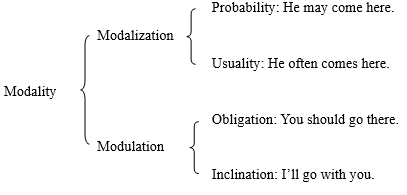同学们,实践是检验真理问题的唯一标准,运用你们学到的知识实践检验一下能力提升了吗?

参考答案
Interpersonal function is fulfilled by mood and modality.
Mood
Mood expresses the speaker’s attitude and serves for interpersonal function. It is a syntactic constituent made up of the subject and the finite. The subject is the first noun or phrase in a statement. The finite is a verbal operator that express tense (e.g. is was, have. had) or modal meaning (e.g. should, can, must) as well as positive or negative form. The reminder is called residue.

Modality and polarity:
The finite expresses not only tense but also polarity and modality. Any finite expresses polarity because it is either positive or negative (however, polarity may be expressed by never, hardly, etc.). The semantic space between “yes” and “no” is pressed by modality. Modality can be categorized by modalization and modulation.
Modalization: how valid the information is in terms of probability (how likely it is) or usuality (how frequent it is).
Modulation: the of obligation on the person to carry out the commands; the degree of inclination of the speaker to fulfill the offer.


